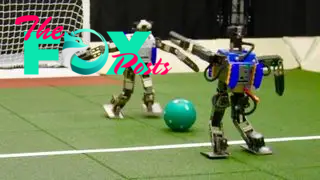Technology
Watch derpy robots show off their soccer skills thanks to new AI training method
Scientists have trained miniature humanoid robots to play soccer using a new artificial intelligence (AI) training method — and footage shows the robots demonstrating their skills in a one-on-one Game.
In the short clips, two bipedal robots play several games in which one is attacking a goal and the other is defending it.
They kick the ball around, block shots and scurry across the pitch — all while waving their arms and falling over in the process. But at least they try to maintain their balance and recover quickly after a fall.
It might not look like it at first, but they're also playing highly strategically — learning how the ball moves and anticipating their opponent's next moves as they try to outwit and outpace them, the scientists said in a study published April 10 in the journal Science Robotics.

Humanoid robots are difficult to configure because every movement needs to be programmed — which requires scientists to compile enormous amounts of data. Many modern humanoid robots, however, have been given a helping hand thanks to AI. Self-learning, thanks to AI, would mean robots wouldn't need ever single motion and movement pre-scripted or programmed. For example, the Figure 01 robot can learn by just watching video — with scientists previously teaching it to make coffee by showing it just 10 hours of training footage.
Related: Forget making coffee — Boston Dynamics puts Atlas to work lifting heavy automotive struts in latest flex
In the new study, Google DeepMind scientists trained their miniature Robotis OP3 robots to play soccer using a technique called "deep reinforcement learning." This is a machine learning training technique that combines several different AI training methods.
-

 Technology9h ago
Technology9h agoThere Is a Solution to AI’s Existential Risk Problem
-

 Technology12h ago
Technology12h agoUS pushes to break up Google, calls for Chrome sell-off in major antitrust move | The Express Tribune
-

 Technology15h ago
Technology15h agoPublic health surveillance, from social media to sewage, spots disease outbreaks early to stop them fast
-

 Technology17h ago
Technology17h agoTikTok, PTA host youth safety summit in Pakistan | The Express Tribune
-

 Technology20h ago
Technology20h agoWhy a Technocracy Fails Young People
-

 Technology1d ago
Technology1d agoTransplanting insulin-making cells to treat Type 1 diabetes is challenging − but stem cells offer a potential improvement
-

 Technology1d ago
Technology1d agoJapan's $26 billion deep sea discovery sparks serious environmental concerns | The Express Tribune
-

 Technology1d ago
Technology1d agoShould I worry about mold growing in my home?



























